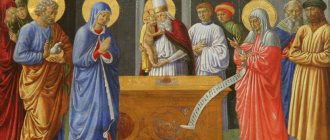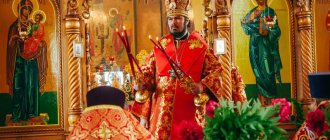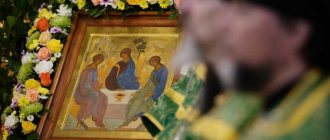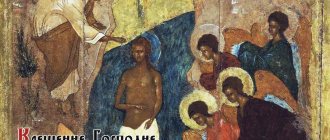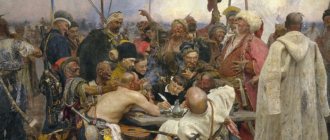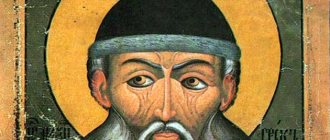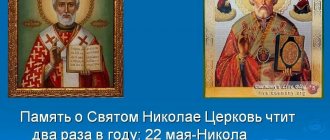Traditions on Maxim's Day
As a rule, housewives baked pies with fillings of meat, eggs, mushrooms, and fish for Maxim. Family members, beggars and simply kind people were treated to pies. It was customary to make peace with those with whom there was a quarrel. We also tried to go to church on February 3 and pray for peace and help in a difficult situation.
If you pray to Maxim the Greek on this day for a loved one, then everything in his life will be fine. A prayer to Maxim the Greek will protect you from harm and give you hope for the future. Often girls of marriageable age without a dowry, orphans, and destitute people prayed to this saint. There were also signs that they tried to track.
They said that on February 3, if you have an insoluble problem, you can go into the forest, find a birch tree there and lean against it, talk about everything that worries you. It is believed that on the way back the right solution will definitely be found.
Who is he and why do we celebrate this day?
In the thirteenth century there lived a rich Greek nobleman, who had a son, Maximus. Based on his origin, Maxim received the nickname Greek. During his life, the young man traveled a lot, studied various sciences and foreign languages, but the time came when he decided to become a monk. By the way, knowledge of “foreign” languages was very useful to him. Almost immediately, Maxim was sent by the monastery to the Grand Russian Prince Vasily III as a translator. His mission was to translate the king's books, which his mother left for him. He made his first translations into Slavic for the Psalter and the Acts of the Apostles.
But not only translations were his activities at the monastery. It is believed that Maxim the Greek became a comforter, helped in trouble, stood up for the poor and orphans. Believers still hope for the help of Maxim the Comforter and on this day they turn to him with gratitude or request.
An epidemiologist said whether re-vaccination with Sputnik V is possible
Photo of asteroid 2001 FO32, which successfully flew past Earth
St. Petersburg and other regions with the largest increase in crime in 2020
For this holiday, it is customary to prepare pies with different fillings - with meat, eggs, mushrooms or fish, and treat them to all loved ones, as well as the poor and helpless. On this day, people tried to go to church and pray for peace, forgiveness, and improve relationships with those with whom they were in a quarrel.
It is also worth praying for the well-being of your family, loved one, friend, and distant relatives. That day the whole family walked into the yard, its members joined hands, shook off the snow from the trees and said: “What God has united, man cannot separate.”
There is such a belief that if you pray for a person’s well-being, then for the next year he will not know trouble. If at the time of the holiday there was unfinished business, then it was customary to go into the forest, find a lonely birch tree there, hug it and talk about your problems, what is bothering you. And the right decision came immediately - on the way back home from the forest.
There were also old pagan beliefs - on this day they predicted the weather, the fertility of the land and the harvest for the entire next year. For example, if the sky was clear on this day, then severe frosts and a poor harvest were promised. And if on February 3 the weather was cloudy and the month did not appear because of the clouds, then the people rejoiced, because it was believed that life would be “good.”
There were many signs and sayings, and people always treated them with respect. For example, if the moon was visible through the clouds, farmers were promised a large harvest of grain. Here are a few more signs and sayings for the holiday:
Bringing the rose bush back to life after winter: how to properly reanimate flowers
Tested for generations: we make effective fertilizing for seedlings
Russian and American scientists want to “recode” mosquitoes by stopping them from biting
- A clear dawn promises frosts.
- A clear sky promises prolonged frosts and an early spring, poor harvests and empty barns in the fall.
- If on February 3 a husband and wife shake the snow off a tree together, then their family life will be happy.
- If a child was born on Maxim's Day, it means he should be a good family man.
Folk signs on Maxim's Day
- If there are a lot of clouds in the sky, then you should expect a rich wheat harvest.
- The sun is shining brightly - there will be frosts in the coming days.
- If a previously planned meeting did not take place on this day, then this is good. Don't despair.
- If you do good deeds, the good will return in the near future.
- Moon calendar
- During this period, it is advisable to resolve all matters that were constantly put off “for later.” Meetings with higher authorities or superiors are possible.
- The day is favorable for concluding contracts.
- On this day it is advisable not to start anything new. Focus on those things that require immediate attention.
Life of Blessed Maxim of Moscow
The feat of voluntary foolishness, for Christ's sake, was especially widespread in Rus'. These blessed holy people did not go into the desert to pray for the whole world, but on the contrary, they came to cities, lived among people and suffered a lot from them, but they were with their people and bore all the hardships of their life. The Lord usually revealed fools to the world in difficult times for the people. The blessed loved people so much that they could not leave them in difficult times; they were there, but in their humility they hid their holiness under the guise of madness for this world. The holy fools spoke figuratively, secretly, sometimes in the folk language of proverbs, but their words reached the very heart of a person. They endured even greater suffering than ordinary people, and the people appreciated their humility, were ready to hear them and listen to them - from the poorest commoner to the king. Rus' loved its holy fools, and they loved their people. So Blessed Maxim did not go to escape into the desert or a monastery, but lived on the streets of crowded and noisy Moscow of the 15th century, during difficult times for the Russian people - raids of the Horde, drought, epidemics. Nothing is known about his parents, time and place of birth.
At any time of the year, Maxim walked almost naked, did not have his own shelter, wandered the streets, most often lived in the open air in the heat and cold, ate only the meager food that people served him, he had no family and was humanly alone . This is difficult for a modern person to understand: why should a person, living in those difficult historical conditions for the country, voluntarily burden himself with even greater need? Enduring all the hardships, Saint Maxim did not give up prayer to the Lord - thereby he was strengthened and saved. God works in mysterious ways. A person is, first of all, his soul, thoughts, aspirations. Blessed Maxim voluntarily renounced all the blessings of this world and even his mind, for the sake of saving his soul and his neighbor, for the sake of union with Christ in earthly and eternal life. This is Love. Love for Christ and for people. His whole life was an exposure of corruption, emptiness and madness of the world. Saint Maxim supported and consoled many people with his words, and denounced some for admonition.
He endured insults, ridicule and contempt from people, hid his wisdom with external madness, thereby cleansing his soul and heart from pride, desire for glory and fear in order to meet God, he learned to love people and hate sin. First of all, he cleansed his soul from sin, but also did not leave his neighbors to perish in sin. Saint Maxim was not afraid to speak the truth to everyone in need of admonition and reproof, even to the powerful of this world, thereby showing love and indifference to man. For the edification of his neighbors, he often appeared in crowded meetings and at market places, did not hesitate to enter vicious societies and, under the cover of foolishness, denounced wickedness and led the most brutal sinners to the path of repentance.
He tried to do all his good deeds secretly, even his reproofs and instructions were in a hidden form, incomprehensible at first glance, but soon the person understood what the saint was telling him. Blessed Maxim saw the hearts of people and tried to warn them from committing sin. Sometimes he denounced people explicitly, but under a strict ban on keeping what he heard secret. If Saint Maxim noticed that people began to revere and praise him, then he tried to destroy these opinions of people with strange or indecent actions, imaginary participation in unvirtuous actions, and sometimes violation of church traditions and rules.
The holy fool’s denunciations did not remain fruitless; many Muscovites turned their hearts to God. His sayings are interesting:
“Although the winter is fierce, yet sweet is paradise,” said Blessed Maxim, running naked through the streets of Moscow, teaching everyone patience and enduring everyday hardships.
“Let us endure and we will be people; for patience God will give salvation.”
“Not everyone is like wool, and vice versa. The lascivious pig has a log around his neck. They will beat you for the cause, obey and bow lower. Don’t cry, you’re beaten, cry, you’re not beaten.”
“Little by little, damp wood catches fire.”
To those suffering from hypocrisy and pharisaical piety he said:
“Everyone is baptized, but not everyone prays.”
“The goddess is homely, but the conscience is corrupt.”
“By beard is Abraham, but by deeds is Ham.”
“God will find out every untruth. Neither He nor you will deceive Him.”
Prayer to Maxim the Greek
Reverend Father Maxima! Look upon us mercifully and lead those who are devoted to the earth to the heights of heaven. You are a mountain in heaven, we are on earth below, removed from you, not only by place, but by our sins and iniquities, but we run to you and cry: teach us to walk in your way, teach us and guide us. Your entire holy life has been a mirror of every virtue. Do not stop, servant of God, crying to the Lord for us.
By your intercession, ask from our All-Merciful God the peace of His Church, under the sign of the militant cross, agreement in faith and unity of wisdom, destruction of vanity and schism, confirmation in good deeds, healing for the sick, consolation for the sad, intercession for the offended, help for the needy. Do not disgrace us, who come to you with faith. All Orthodox Christians, having performed your miracles and beneficent mercies, confess you to be their patron and intercessor.
Reveal your ancient mercies, and to whom you helped the Father, do not reject us, their children, who are marching towards you in their footsteps. Standing before your most honorable icon, as I live for you, we fall down and pray: accept our prayers and offer them up on the altar of God’s mercy, so that we may receive your grace and timely help in our needs. Strengthen our cowardice and confirm us in faith, so that we undoubtedly hope to receive all the good things from the mercy of the Master through your prayers.
Oh, great servant of God! Help all of us who flow to you with faith through your intercession to the Lord, and guide us all in peace and repentance, end our lives and move with hope into the blessed bosom of Abraham, where you now rest joyfully in your labors and struggles, glorifying God with all the saints , in the Trinity glorified, the Father and the Son and the Holy Spirit, now and ever and unto ages of ages. Amen.
Also on February 3, Anastasia . If you have relatives, friends or acquaintances who bear the name Anastasia, do not forget to congratulate them on this day.
Another prayer option
Oh, sacred head, reverend father, most blessed Abvo Maxim, do not forget your poor to the end, but always remember us in your holy and auspicious prayers to God. Remember your flock, which you yourself shepherded, and do not forget to visit your children. Pray for us, holy father, for your spiritual children, as if you have boldness towards the Heavenly King, do not be silent for us to the Lord, and do not despise us, who honor you with faith and love. Remember us unworthy at the Throne of the Almighty, and do not stop praying for us to Christ God, for you have been given the grace to pray for us.
We do not imagine that you are dead, even though you have passed away from us in body, but even after death you remain alive. Do not give up on us in spirit, keeping us from the arrows of the enemy and all the charms of the devil and the snares of the devil, our good shepherd. Knowing that you are truly alive even after death, we bow down to you and pray to you: pray for us to Almighty God, for the benefit of our souls, and ask us time for repentance, so that we may pass from earth to heaven without restraint, from the bitter ordeals of the demons of the air princes and may we be delivered from eternal torment, and may we be heirs of the Heavenly Kingdom with all the righteous, who from all eternity have pleased our Lord Jesus Christ, to Him belongs all glory, honor and worship, with His Beginning Father and with His Most Holy and Good and Life-Giving Spirit, now and ever and ever. Amen.
Found a violation? Report content
St. Saint Maximus the Confessor
Monk Maxim was born in Constantinople in the 7th century. Thanks to his brilliant education, in addition to his personal qualities, he took the post of first secretary under the emperor, but his rejection of the vain court life prompted him to take monastic vows.
Having become a monk, Maxim amazed everyone with his humility and wisdom, so the brother monks elected him abbot of the Chrysopolis monastery. However, even here he did not become proud, but still remained humble and pious.
Monothelism, a heretical tendency in Christianity that recognized only one divine nature of Jesus Christ, was widespread in those days. Monotelism undermined the unity of the Eastern Church and contributed to divisions between peoples.
It was in the fight against this heresy that Maximus the Preacher’s loyalty to the true teachings of the Savior was manifested. He preached sermons, spoke with high-ranking and ordinary believers, and wrote many essays interpreting the Holy Scriptures to debunk monotelism, which gained enormous popularity and respect among the laity, rulers and clergy.
But then Constantius II ascended the imperial throne, adhering to the Monothelite heresy. In 649, the Lateran Council was held in Rome, at which this problem was discussed. The most important role in the condemnation and anathema of monotelism, which was the result of the council, belongs to the Greek monks led by Maximus the Confessor.
Having received the papal encyclical recognizing the doctrine, which he declared to be heresy, the angry Emperor Constant had the monk Maximus imprisoned as a traitor. He was subjected to terrible torture, as a result of which he could no longer speak or write, but the Lord did not abandon the righteous and regained these abilities.
The Monk Maxim predicted in advance the day of his death - August 13, 662. Many miraculous healings took place at his grave, and the icon of St. Maximus the Confessor is revered by all fanatics of the True Faith. According to legend, the icon of Maxim the Confessor depicts a stern old man in monastic robes with a scroll in his hands.
Commemoration: January 21 / February 3, June 21 / July 4 (Discovery of relics)
The Monk Maxim the Greek, after receiving an excellent European education and many travels throughout Europe, arrived on Athos and accepted monasticism at the Vatopedi monastery, where he enthusiastically studied ancient manuscripts.
At the request of Prince Vasily Ioannovich, he arrived in Russia and began translating Greek liturgical books into Church Slavonic. He wrote apologetic and moralizing letters against Mohammedans, papism, pagans, as well as interpretations of St. John Chrysostom on the Gospels of Matthew and John. For his straightforwardness and truth, he fell into disgrace under Metropolitan Daniel for many years: he suffered an unfair trial, false accusations, excommunication from Communion, prison, exile (26 years in total - six years in prison and 20 years in exile in Tver).
In the midst of suffering, the monk also acquired the great mercy of God. An angel appeared to him and said: “Be patient, elder! With these torments you will be freed from eternal torment.” In prison, the reverend elder wrote with charcoal on the wall a canon to the Holy Spirit, which is still read in the Church: “Who fed Israel with manna in the desert of old, fill my soul, O Lord, with the All-Holy Spirit, so that I may serve You with pleasure in Him. "
Only after twenty years of staying in Tver was the monk allowed to live freely and the church ban on him was lifted. The Monk Maxim the Greek spent the last years of his life in the Trinity-Sergius Lavra. He was already about 70 years old. Persecution and labor affected the health of the saint, but his spirit was cheerful; he continued to work. Together with his cell attendant and disciple Neil, the monk diligently translated the Psalter from Greek into Slavic. Neither persecution nor imprisonment broke the Monk Maxim.
St. Maxim the Greek is the heavenly patron of scientists, theologians, translators, students and seminarians. Prayerful intercessor for missionaries, catechists and apologists. They pray to St. Maximus the Greek for confirmation in the faith, strength of spirit and faith, understanding of Orthodox doctrine and Scripture, conversion of Gentiles and sectarians to Orthodoxy, they ask him for help and support during persecution for the faith and unjust oppression of the authorities. The Monk Maxim the Greek has the gift of healing for various diseases, especially depression and despondency.
Which saints bore the name Maxim
Most of the saints named Maximus happened to live during times of persecution of Christians. They showed incredible dedication in defending the True Faith, despising all torment and thereby showing an example of true fidelity to Christ's teaching. Here are the names of these holy martyrs: Maximus of Adrianople, Maximus of Marcianopolis (Misian), Maximus of Asia, Maximus of Antioch, Maximus of Africa.
Particularly noteworthy are two saints who made a huge contribution to the struggle for the purity of Christ’s teaching and its dissemination: Maxim the Confessor and Maxim the Greek. Both of them were canonized as saints, and to this day the icon “Maxim the Confessor” and the icon “Maxim the Greek” are revered by the Orthodox.
What do they pray to the saint for?
Saint Maximus the Confessor in Orthodoxy is considered the patron saint of missionaries, theologians and preachers. Prayers are addressed to the monk in the following cases:
- during persecution for faith;
- for admonishing the lost and those of other faiths;
- for help with studies;
- for a deeper understanding of the Holy Scriptures;
- about healing from spiritual and physical infirmities;
- for blessings in earthly affairs.
